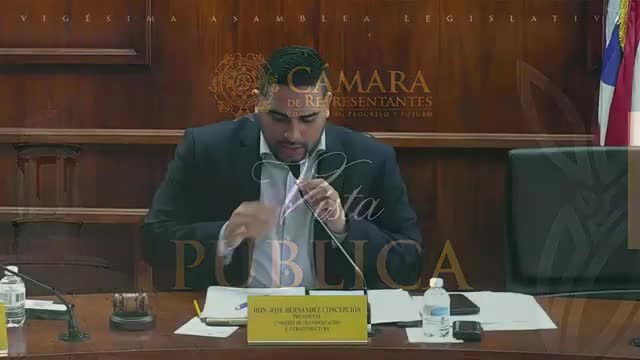Puerto Rico panel opens review of peer‑to‑peer car‑rental platforms following Turo authorization
Get AI-powered insights, summaries, and transcripts
Subscribe
Summary
The House Commission on Transportation and Infrastructure opened a review of peer‑to‑peer car‑rental platforms under Resolution 112, hearing agency testimony about an interim authorization the Negociado de Transportación y Otros Servicios Públicos granted to Turo and wide‑ranging concerns about insurance, identity verification and enforcement.
The House Commission on Transportation and Infrastructure opened a legislative review of peer‑to‑peer car‑rental platforms on the basis of Resolution 112, hearing testimony from the Negociado de Transportación y Otros Servicios Públicos about regulatory, insurance and enforcement questions raised by companies such as Turo.
In testimony, Jaime La Fuente, president of the Negociado de Transportación y Otros Servicios Públicos, described the agency’s handling of a Turo Inc. application. He said the company applied as a “service not regulated” on Sept. 3, 2024; the agency held a public hearing on Jan. 30 and on April 1 issued an order granting authorization to operate under that non‑regulated classification while imposing a one‑year requirement that the company maintain a local office so the agency could evaluate whether that condition should remain. La Fuente said Turo has not yet started operations in Puerto Rico.
The commission’s author, Representative José Aponte Hernández, pressed agency officials on practical risks for consumers and third parties. Aponte Hernández asked how customers show proof of insurance and how the system would handle a renter who causes a serious crash and then leaves the island; he also raised the possibility that vehicles listed on a platform could remain registered for rental after sale. Juan Ramírez, legal advisor to the Negociado, said the transaction can be insured in several ways, including policies sold through the platform or the vehicle owner’s own coverage, and noted that which insurer pays will depend on how each rental transaction is structured.
Agency officials cited existing statutory authority under Ley 109 de 1962 and the agency’s code of regulation (Reglamento 93‑58, adopted Feb. 7, 2022) as the basis for issuing authorizations and imposing conditions. Ramírez said the agency uses the “service not regulated” pathway when a specific business model (here, peer‑to‑peer rentals) is not already addressed in the rules; the authorization can include conditions “including but not limited to” limits on territory, required vehicle models, and duration.
Lawmakers and staff focused on several recurring enforcement questions: how platforms verify driver identity and insurance remotely; how the agency will track which specific vehicles are being offered (the Negociado requires registered inventory and said vehicles put up for rental must be registered with the agency); whether a local office should be required permanently or only if complaints accumulate; how existing airport and port authorities’ rules intersect with platform activity at terminals; and the agency’s staffing levels to perform inspections.
La Fuente warned the commission of resource limits, saying the Negociado currently has “14 inspectores para toda la isla para fiscalizar sobre 40 franquicias.” Lawmakers also discussed complaints and litigation in some U.S. states—examples cited included California (airport lawsuits), New York (enforcement actions), Massachusetts and Illinois—and asked the agency to compare Puerto Rico’s approach with other jurisdictions.
Committee members sought concrete steps before any broader policy changes. The commission chair said the panel will convene a working group and set a date for a multi‑agency session; members scheduled a meeting with Secretary Víctor of the Department (date set for May 5 in the hearing) and asked the Negociado to provide the Turo file and the company’s requested reconsideration of the agency’s conditions. The chair also asked that insurers and other stakeholders be invited to future briefings.
No formal votes were taken during the hearing. The commission recorded two staff directions: (1) the Negociado was asked to deliver, within five days, the documents showing the agency’s regulatory “merge” and the points Turo seeks to change in its reconsideration; and (2) the commission will organize a multi‑party working session and a follow‑up meeting with the named secretary to examine enforcement tools and the agency’s access to databases used for license and registration validation.
The commission left open whether new legislation will be recommended. La Fuente said the Negociado is prepared to continue monitoring operations and to propose recommendations as experience accumulates, and he suggested that any statutory changes also consider preserving flexibility for the agency to adapt existing rules for new technology.
